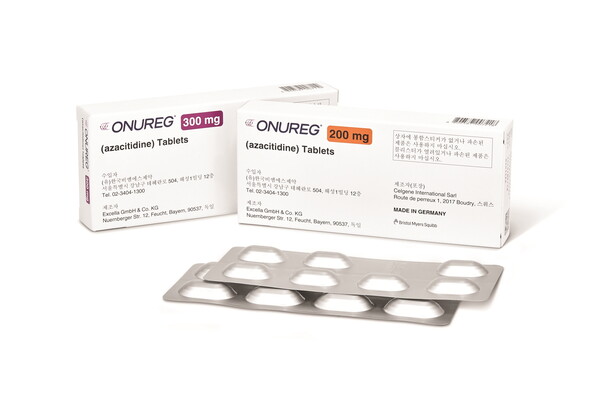BMS Korea said Tuesday that Onureg (azacitidine), a maintenance therapy for acute myeloid leukemia (AML), will be covered by health insurance from this month.

Coverage is available for adult patients with AML who have achieved complete remission (CR) or complete remission with incomplete hematologic recovery (CRi) after induction therapy, with or without consolidation therapy, and are not candidates for hematopoietic stem cell transplantation (HSCT).
Additionally, patients should be 55 years and older, belong to the cytogenetically intermediate or high-risk group, have no prior hypomethylating agent (HMA) use or stem cell transplant, have a systemic condition not suitable for stem cell transplant, and previously dosed within seven days before or after four months of achieving CR or CRi after induction therapy.
Patients with AML who achieve a first complete remission may still need additional treatments to lower the risk of relapse due to residual leukemia cells, a BMS Korea official said.
While some patients can be cured with a stem cell transplant, the official added that a significant number of patients are not eligible for a stem cell transplant due to advanced age, comorbidities, or adverse reactions to previous treatments.
“For patients with AML who have achieved remission with standard-dose remission-inducing chemotherapy but are unable to undergo a stem cell transplant, they must receive follow-up treatment to prolong remission and maximize relapse prevention,” said Professor Cheong Jung-won of Hematology at Severance Hospital. “We believe that the coverage of Onureg will help reduce the risk of relapse and prolong survival for AML patients in Korea.”
Onureg is the first maintenance treatment for AML approved in Korea and is administered orally once daily. In the QUAZAR AML-001 trial, Onureg achieved a median overall survival (mOS) of 24.7 months, compared to 14.8 months in the placebo arm. The proportion of patients alive at one and two years of treatment was also higher with Onureg (73 percent and 51 percent) than with the placebo (56 percent and 37 percent). The median relapse-free survival (RFS) of 10.2 months was 5.4 months higher with Onureg than with placebo, demonstrating a significant reduction in the risk of relapse.
“This is the second of five new drugs that won approval recently, after Inrebic (ingredient: fedratinib), and we will continue to improve access to the treatment of serious diseases with high unmet needs,” BMS Korea CEO Lee Hye-young said.



































